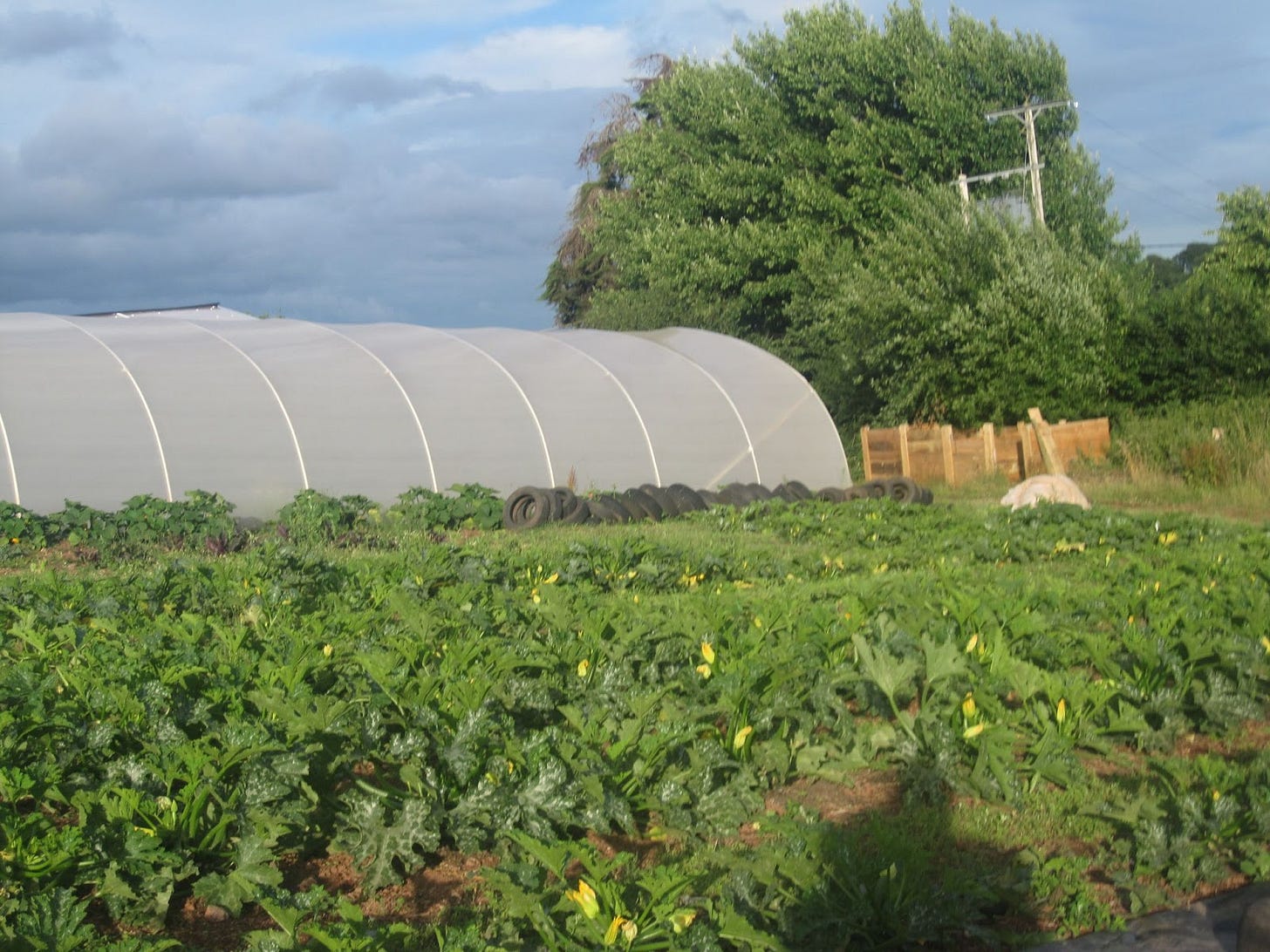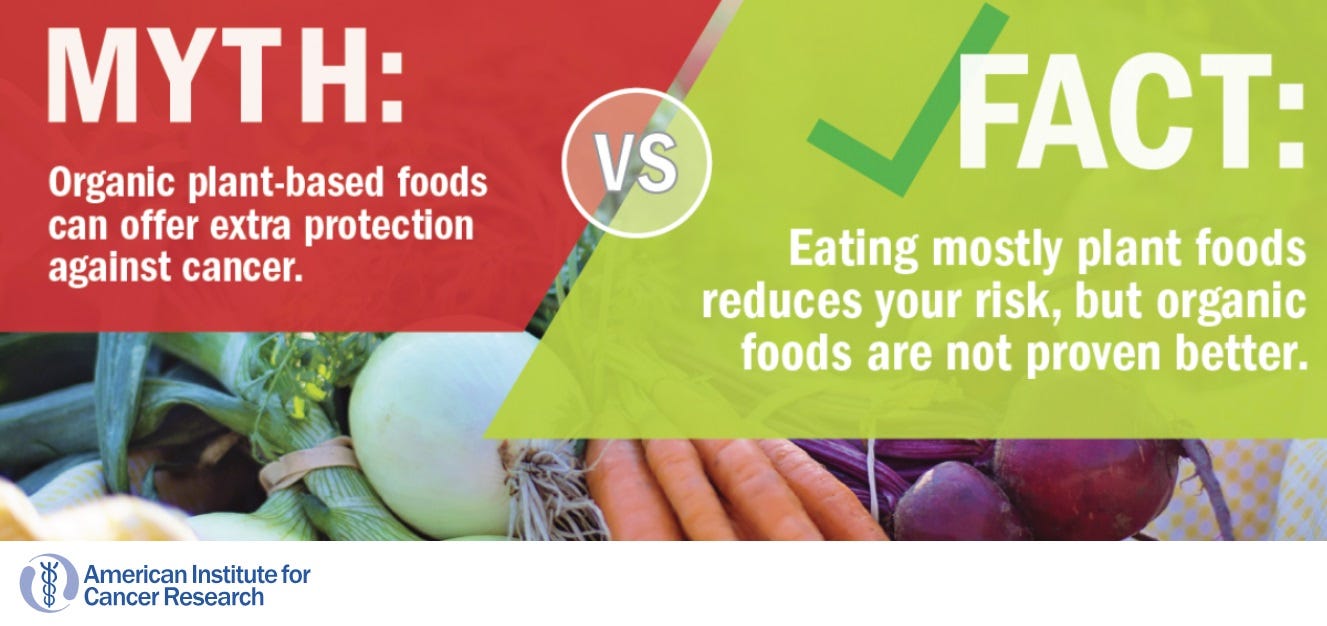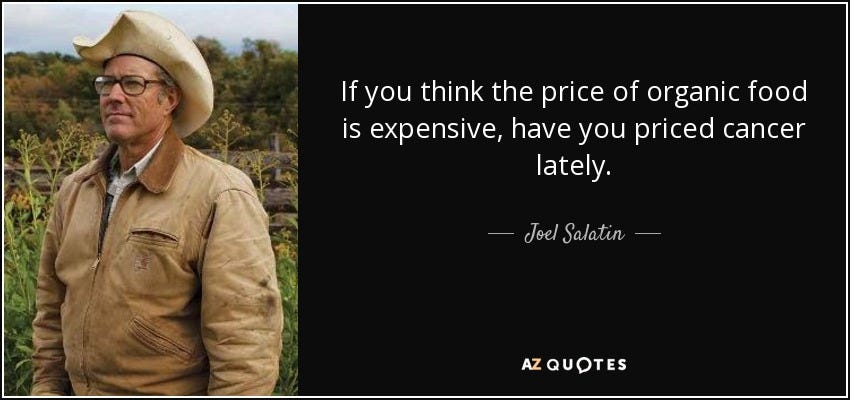Unearthing the truth about organic food and farming
Proponents argue that it’s better for our health and the environment. Science suggests otherwise
“It is now 14 years since I first suggested that organic farming might have some benefits and ought to be taken seriously. I shall never forget the vehemence of the reaction.. much of it coming from the sort of people who regard agriculture as an industrial process, with production as the sole yardstick of success.” - King Charles III
In my hippy activist years, I spent a lot of time volunteering on organic farms with a scheme known as World Wide Opportunities on Organic Farms (WWOOF), helping harvest crops and learning how to grow food without pesticides.
Organic farming is a method of agricultural production that excludes the use of synthetic substances such as pesticides, synthetic medicines or fertilisers, plant growth regulators, and genetically modified organisms (GMOs). As an active member of the traditional environmental movement, I believed that ‘organic’ crops were better for the environment and human health.
The idea of ‘organic farming’ was popularised by Walter Ernest Christopher James, also known as Lord Northbourne, who first used the term in his book Look to the Land in 1940. He described the farm as an ‘organism’ and called for a holistic, ecologically balanced approach to farming - in contrast to what he called chemical farming. His writings led to the rise of the organic food movement.
The organic food industry is lucrative. In 1990, when he was Prince of Wales and Duke of Cornwall, King Charles set up the organic food company Waitrose Duchy Organic, which has an annual turnover of millions. Between 1997 and 2011, sales of organic foods in the US increased from $3.6 billion to $24.4 billion, even though organic foods are often twice as expensive as their conventionally grown counterparts.
In my early 20s, I tried to buy and consume only organic foods, which proved impossible for someone on a low income. Figures vary depending on the item, but organic foods can cost as much as 82% more than conventionally grown items. Ironically, for what I believed to be health reasons, I was making the poor choice to consume fewer fresh fruits and vegetables because I couldn’t afford their organically grown equivalents. Why? Because I had been told many scary stories about how non-organic foods damage human health. Although my peers argued that organic is better for the environment, it was fear-based messaging that swayed me when it came to making choices as a consumer. For example, I was frequently told that many cancers are a result of consuming pesticides, insecticides and fungicides. These arguments persist in environmental circles today.
Traditional environmentalists have long argued that ‘chemicals’ are evil, while so-called ‘natural’ substances are preferable. This is ackamarackus. Everything in the world, including compost and manure, is composed of chemicals. While it’s true that direct exposure to carcinogenic substances increases cancer risk, as with everything, the devil is in the dosage - there is a substantial difference between consuming a product that was grown in soil where pesticides were used and directly spraying fields with pesticides.
Occupational exposure can certainly harm farmers and other workers, such as those involved in the production, transportation and delivery of large quantities of agrochemicals. Incorrectly handled, any substance can be harmful. This is as true for the cleaning products you use in your home as it is for pesticides used on farms. Many farm workers have been found to neglect the need for personal protective equipment (PPE) and lack the training needed for the safe handling of pesticides, which increases their cancer risk.
Is organic food better for you? Science vs activist messaging
Perhaps I sound like an anomaly because I was in hippy circles, but actually, the messaging from organic food activists has had a significant impact on the perception of food worldwide. Studies have found that most American citizens believe that organic produce is better for their health than conventionally grown produce, with roughly 68% of Americans buying some organic food. Many consumers also believe that they are supporting local farmers by buying organic food, as organic food is often assumed to be locally grown, when in fact, most of the produce people buy comes from distant industrial farms - over 80% of all US organic sales are actually made by corporate conglomerates like ConAgra, Heinz, and Kellogg.
Fear-based messaging tactics used by activist groups and organic marketers about the safety of non-organic produce have had a negative impact on public perception. As a result of this, people on low incomes have reduced their consumption of fruit and vegetables - both organic and non-organic. According to research in Nutrition Today:
“Misleading messaging which inaccurately describes certain fruits and vegetables as having ‘higher’ pesticide residues results in low-income shoppers reporting that they would be unlikely to purchase any fruits and vegetables – organically or non-organically grown.
The findings are also concerning since the safety claims carried predominantly by groups like the Environmental Working Group (EWG) and Only Organic about pesticide residues have been repeatedly proven to be scientifically inaccurate. For the last 20 years, EWG has released an annual so-called ‘dirty dozen’ list, which urges consumers to eat only organic versions of popular produce items accompanied by misleading and unscientific claims regarding supposedly dangerous pesticide residue levels. In fact, a peer-reviewed analysis of EWG’s list showed that substitution of organic forms of produce for non-organic produce did not result in any decrease in risk because residue levels are so minute on these fruits and vegetables, if they are present at all.”
As people have become aware of this trend, there has been some pushback against the argument that ‘cancer costs more than organic food’ within the organic activist community - for example, by this hippy mother, but she also perpetuates the myth that organic food is ‘better for you’.
Is it? Organic food production is a broad and complex industry with many variables, and for many years there was a paucity of research. We now know that organic food items do not appear to have a nutritional advantage over their conventional counterparts, and a review of data from 237 studies concluded there were no convincing differences between organic and conventional foods in nutrient content or health benefits.
Still, the myths prevail.
Worryingly, some of the official advice given is also incorrect, such as this statement by the charity Breast Cancer UK:
“Exposure to certain banned pesticides increases breast cancer risk. Some of these persist in the environment. Pesticides that are currently used, e.g. glyphosate (a weed killer) and malathion (used to kill insects), may also increase breast cancer risk, although more studies are needed to confirm this. Eating organic food will reduce pesticide exposure.”
The website still suggests that people buy organic foods, grow food at home, and “Check out the Dirty Dozen – lists of fruit and vegetables with the most pesticide residues.”
The charity heavily emphasises having a supposedly evidence-based approach and boasts of its successes in raising awareness of the causes of breast cancer. With such conflicting information from supposedly scientifically literate bodies, it’s not surprising that people are confused about whether or not to prioritise eating organic foods.
The impact of diet on human health is difficult to study due to the many lifestyle differences, genetics and other factors that impact human health. When individual studies appear to be conflicting, it’s important to look at the overall data analysis or review to identify which studies are outliers and what the bulk of the evidence demonstrates.
A study undertaken at The University of Oxford with a large sample size of 600,000 women found that women who always or mostly eat organic foods were not less likely to develop cancer than women who eat a more conventional diet. Nor was there evidence that a woman’s overall cancer risk was decreased by generally eating organic food.
Cancer Research UK summarises:
“Do pesticides on food cause cancer?
No. There can be small amounts of pesticides or herbicides on the surface of what we eat. But levels are low and do not increase the risk of cancer in people.
The Food Standards Agency monitors food safety in the UK. They make sure that the levels of pesticides in food in the UK are not harmful for human health.
The NHS also recommended washing fruit and vegetables before you eat them, to remove any possible bacteria leftover from the soil. This will ensure they are clean and safe to eat.”
Eating a healthy and balanced diet consisting of plenty of fresh food has been found to reduce cancer risk. Forgoing this because organic food items are too expensive therefore increases the risk of some cancers.
Is organic farming better for the environment?

The topic of land use is often ignored in climate activist circles. The US Department of Agriculture estimates that shifting US agricultural production to organic would require an area greater than the state of California to be converted from pristine land into agriculture.
Although a switch to organic farming could reduce the direct greenhouse gas emissions from livestock by 5% and from crops by 20% per unit of production, it would also reduce yields, which would mean having to import more food from overseas. A meta-analysis of the data found that organic farming yields are between 5% and 34% lower than those from conventional agriculture. This means that if half the land used to meet that spike in demand was converted from grasslands, which are essential for storing carbon, there would be an overall increase of greenhouse gas emissions by 21%.
As part of its plans for achieving carbon neutrality, the California Air Resources Board wants to transition 20% of the state’s farmland to organic practices by 2045. That means converting about 65,000 acres of conventional fields to organic practices every year. However, there is a risk that this transition could lead to an overall increase in the amount of pesticide used by growers throughout the state, as a study undertaken in California found that when new organic fields are created, the resulting increase in insects prompts conventional growers to boost their pesticide use by an amount large enough to offset the reduction in organic fields. In other words, conventional fields that are surrounded by organic agriculture have to use more pesticides.
For those who have been following my work, this ideology-based rhetoric may remind you of California’s quixotic energy policy.
Another study found that, were England and Wales to aim for 100% organic agriculture, net emissions would rise due to the need to clear additional grasslands or forests to grow enough food to make up for the productivity loss. Again, organic farming produces more climate pollution than conventional practices, largely due to the additional land requirement.
Natural fertilisers like manure do have some environmental benefits, as they contain more micro-nutrients than synthetic fertilisers and produce less pollution. However, the lower yield associated with organic farming means that more land has to be devoted to agriculture to feed the same number of mouths. Organic practices could, in theory, reduce climate pollution produced directly from farming, if they didn’t also require more land to produce the same amount of food.
As Our World in Data summarises: “The common perception that organic food is by default better, or is an ideal way to reduce environmental impact is a clear misconception. Across several metrics, organic agriculture actually proves to be more harmful for the world's environment than conventional agriculture.”
Sadly, activist messaging can be powerful, and persistent fear-mongering can wreak havoc - as demonstrated by what has happened in Sri Lanka.
Case study: Sri Lanka
Sri Lanka is an island country in South Asia with a population of 22 million people, over 30% of whom are employed in the agricultural sector.
In 2021, Sri Lanka’s President Gotabaya Rajapaksa told a United Nations summit that he was concerned about Sri Lanka “increasing use of chemical fertilisers, pesticides, and weedicides that led to adverse health and environmental impacts”. Rajapaksa then banned all imports of chemical fertilisers, forcing Sri Lanka’s millions of farmers to go organic virtually overnight.
There are reasons why farmers use agrochemicals: synthetic fertiliser makes crops grow faster and bigger than organic fertiliser, and pesticides control insect infestations and diseases that can destroy crops. Adopting these agricultural inputs since the mid-20th century has helped to lift countries like Sri Lanka out of deadly poverty. When Sri Lanka started subsidising fertilisers in the 1960s, rice yields tripled, and the country became self-sufficient in rice production and could even export rice. Sorry, King Charles III, but for millions of people worldwide who would otherwise starve, production is, by necessity, the ‘sole yardstick of success’.
The government ban, therefore, had serious consequences. Without access to agrochemicals, average rice yields in Sri Lanka were reduced by 30%. The ban on importing chemical fertiliser caused rice production to drop 20% just six months after it was implemented, causing Sri Lanka to spend $450 million on rice imports - more than the $400 million that would have been saved by banning fertiliser imports. Tea production, the country’s prime export, also fell by 18%.
The timing of the ban didn’t help. Sri Lanka’s tourism industry, the backbone of its economy, had already been hit by the Easter bombings in 2019. The pandemic made this worse. Now, drought is also taking a toll on crops and farmers.
In 2022, protesters broke into Rajapaksa’s home and set fire to the Prime Minister’s home. Rajapaksa resigned and fled the country. Just months later, the agrochemical import ban was eased. But there was still no going back to subsidising chemical fertilisers like before - the damage had been done. Agriculture was holding up Sri Lanka’s economic development and food security. Gambling with this has led to poverty nearly doubling in Sri Lanka between 2021 and 2022, climbing from 13% to 25%. Sri Lanka has become the first country in the Asia Pacific region in 20 years to default on foreign debt. Poverty rates are not projected to decline any time soon.
Agriculture is all about trade-offs. While they do have environmental impacts, agrochemicals help farmers grow more food on less land, which is critical for small, developing countries like Sri Lanka that rely on agriculture for feeding hungry mouths and for export income.
A middle way
There are ways to minimise the effects of agrochemicals without abandoning them altogether.
To protect their health, farm workers need to be made aware of the risks of pesticide exposure through adequate training and access to personal protective equipment.
Over ten years, almost 21 million Chinese farmers were trained on how to better manage soil, water, and fertiliser. This resulted in an 11% yield increase for maize, wheat, and rice, and a 15-18% reduction in nitrogen fertiliser use.
Precision farming technologies, like drones and sensors, can also help to more accurately analyse and advise on fertiliser usage.
Implementing any of these practices in the near future won’t be possible in Sri Lanka, given that they require money that the government doesn’t have. Nor will Sri Lanka meet its environmental goals any time soon.
The consequences of the organic movement’s fear-mongering have been far-reaching and deadly. We need to call out misinformation about the supposed health benefits of organic foods - which only hold sway if people are led to believe that conventionally grown foods will make them seriously ill. The EWG’s so-called ‘dirty dozen’ food list harms people on low incomes in particular. The same fears have harmed countless Sri Lankans. Instead of donating to groups like EWG, help Sri Lankans instead.
Organic gardening may be a fun hobby enjoyed by activists and Kings alike, but let Sri Lanka serve as a cautionary tale of the recklessness of abandoning economic stability and industrial agriculture in favour of wishful thinking and a meaningless label. Millions of people are now starving because of this ideology, and there is nothing ‘organic’ about that.








Very good and accurate analysis and summation of industrial vs. organic food production. The effect on land use by the two is enormous. Banning the use of pesticides, herbicides, fertilizers means that yield per acre drops. This increases the cost. Carried out on a global basis, this decreases the amount of food that the world's poorest can afford. This creates increased starvation.
More land used for agriculture means less land available for the natural world. Do we really want to be cutting down forests to make more room for agricultural use? We saw the effects of this in places like Brazil with the clear-cutting of tropical rainforest to make way for sugar cultivation. Or Indonesia with making room for palm oil plantations. The environmental effects of this have been adverse and enormous with no long term economic gain whatsoever.
Banning meat production and consumption has much the same effect. Animals in the food industry are raised on land which is generally incapable of supporting grains or vegetable cropping. Forcing the elimination of meat consumption may have adverse health consequences. But this also will force up the cost of grains and vegetables and thus increase global starvation among the world's poorest people as well.
There may be an unpleasant political aspect to this. The United States and the European Union have been engaged in trade wars over agriculture for at least four decades. So the question becomes to what degree are organic food production requirements simply non-tariff trade barriers.